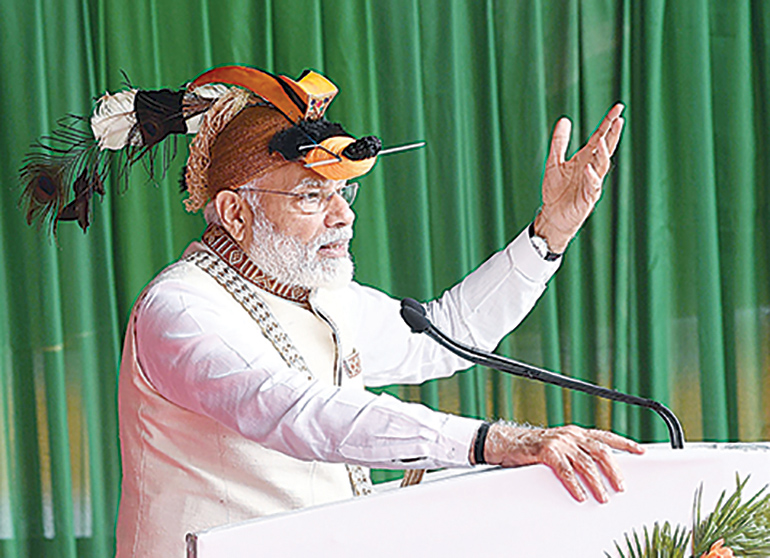
GUWAHATI: A
second day of protests yesterday tainted Prime Minister Narendra Modi's visit
to northeast India where proposals to change a nationality law have sparked
outrage. Protesters waved black flags and burned effigies of the Hindu
nationalist prime minister while some students staged a nude protest outside
the state government complex in the Assam capital of Guwahati. Media reports
said the nude protesters were detained while Assam student groups said police
baton charged another group of activists.
Black flag
protests-considered a strong insult-greeted Modi when he arrived in Guwahati on
Friday night to start the tour of Assam, Arunachal Pradesh and Tripura as he
prepares to call a national election. His nationalist Bharatiya Janata Party
(BJP) has faced a severe backlash in the region over a proposed change to a
1955 citizenship act which would give Indian nationality to Hindus and other
minorities who have fled the neighboring Muslim countries of Afghanistan,
Bangladesh and Pakistan.
Assam, a state of
33 million, has been plagued by decades of tensions between local tribal and
indigenous groups and settlers from outside, including many Muslims and Hindus
from nearby Bangladesh. Modi insisted that his government will ensure that the
amended law does not harm Assam and neighboring states however. Addressing one
public rally, he said the bill, which still needs approval from India's upper
chamber, was a "national commitment" to the minorities.
"The passage
of the bill will ensure that those people who... love India more than their
lives will be accommodated in India. It is a responsibility of India to accept
those people," he said. Modi said
citizenship will only be granted after thorough checks on each applicant. While
groups in Assam want to block all outsiders, human rights activists have
condemned the government law for not covering Muslims. They say it will be the
first time religion has been a criteria for nationality in India, which is
officially secular.
Last year the
Assam government released the first draft of a state citizens' register that
rejected four million mainly Muslim residents who were unable to prove they
were living in the state before 1971, when millions fled Bangladesh's war of
independence. Modi said that his government was speeding up efforts to seal the
India-Bangladesh border. An election is expected to be called for April-May and
the BJP's hopes in the northeastern states have been badly damaged by the new law,
analysts said.
China protests
In another
development, China yesterday protested the visit by Indian Prime Minister
Narendra Modi to the Indian state of Arunachal Pradesh, a contested region
located on the border between the two countries. "The Chinese government
has never recognized the so-called 'Arunachal Pradesh' and is firmly opposed to
the Indian leader's visit," Chinese foreign ministry spokesperson Hua
Chunying said in a statement.
"China urges
the Indian side to... refrain from any action that may lead to the escalation
of disputes or complicate the boundary question," added Hua, some hours
after Modi's visit to the contested area, during which he inaugurated building
work for two airports. Relations between New Delhi and Beijing have been marked
by distrust since a brief but bloody 1962 border war, during which the two
fought over Arunachal Pradesh, with Chinese troops temporarily capturing part
of the Himalayan territory. The dispute remains unresolved, with India
considering Arunachal Pradesh one of its northeastern states while China claims
about 90,000 square kilometers of the territory.
"Indian
leaders visit Arunachal Pradesh from time to time, as they visit other parts of
India. This consistent position has been conveyed to the Chinese side on
several occasions," India's foreign ministry said in a statement
yesterday. In 2017, the two Asian giants were involved in a high-altitude
standoff in Bhutan's Doklam region after the Indian army sent troops to stop
the construction of a military road by China. After two tense months, the
troops from both countries withdrew and last April, Modi met with Xi Jinping in
an effort to reset bilateral relations. - Agencies











